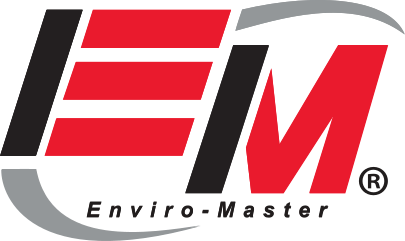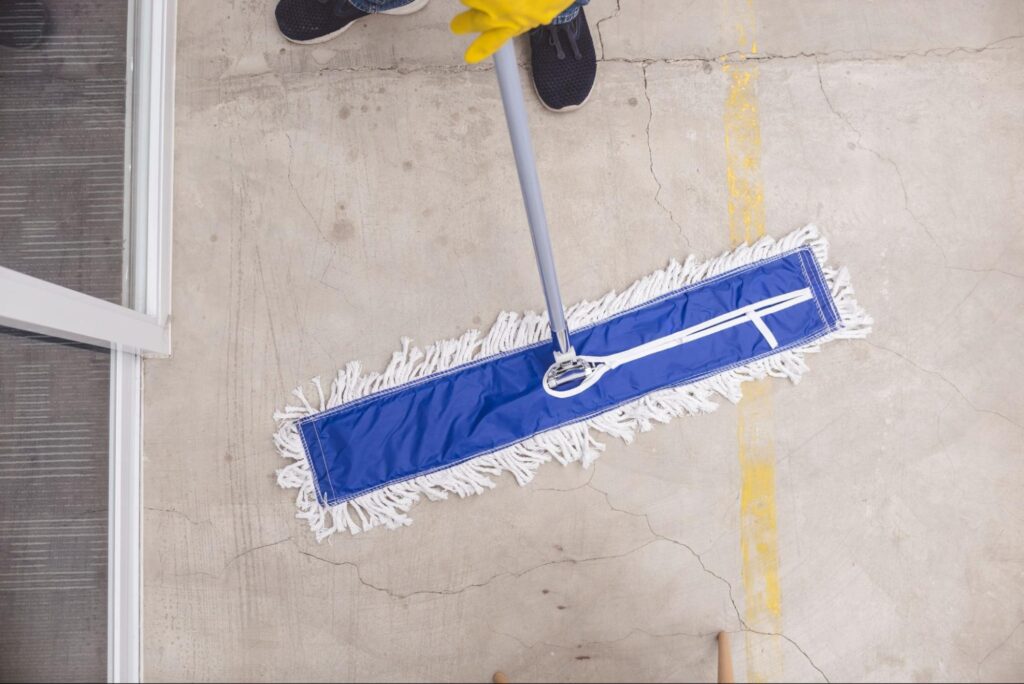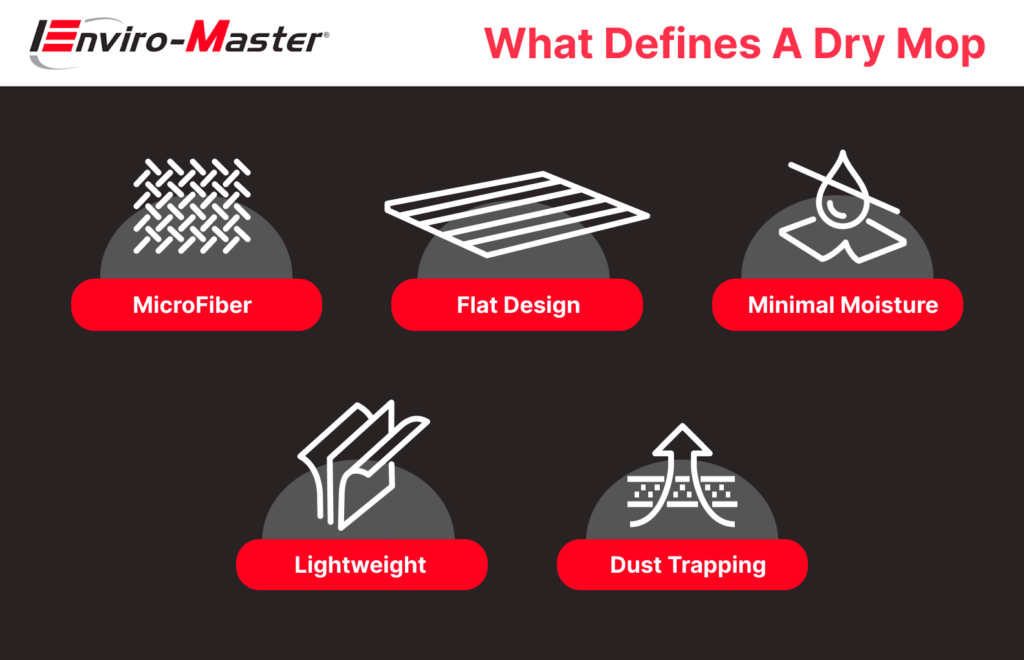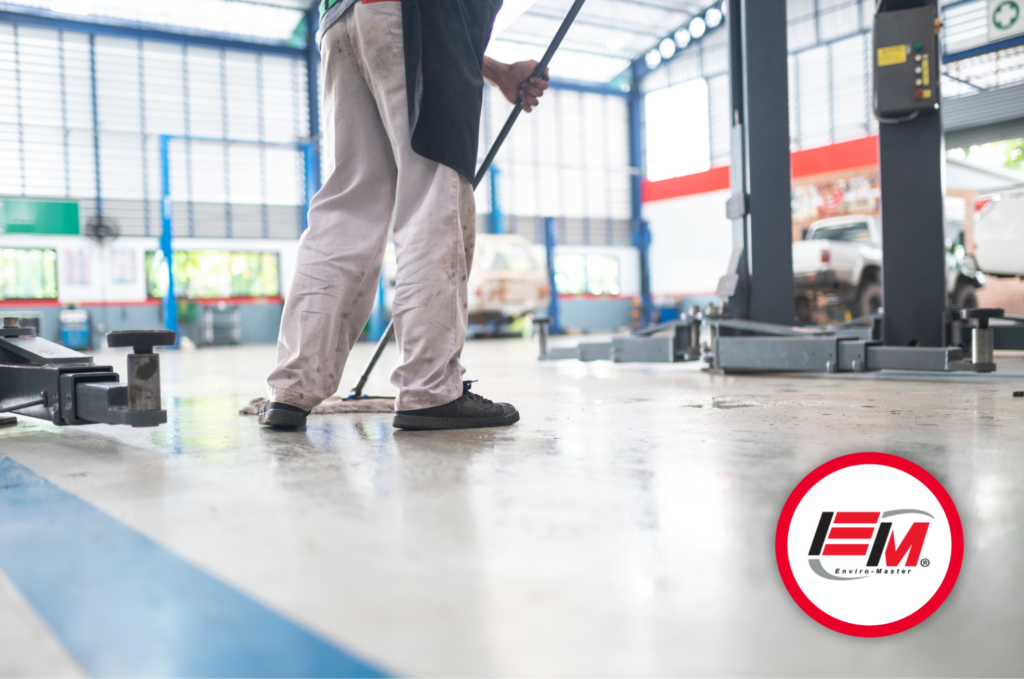Dry mopping, a fundamental cleaning technique, involves using a specialized mop equipped with a dry or slightly damp pad to collect dust, pet hair, and small debris from floors without the use of water or liquid cleaners. This method is especially effective on hardwood, laminate, and vinyl flooring, providing a quick and efficient way to maintain a clean and safe home or business.
Key Features of Dry Mopping
Dry mopping is not just a method of floor cleaning; it’s a strategic approach designed to enhance the cleanliness and longevity of various flooring types with minimal effort. Each characteristic of dry mopping addresses specific concerns related to floor maintenance, from moisture control to allergen reduction
Minimal Moisture
By avoiding the use of water, dry mopping eliminates the risk of water damage to sensitive flooring materials. This aspect is particularly beneficial for surfaces like laminate and hardwood, where excessive moisture can lead to warping, swelling, and other forms of damage.
Efficiency and Convenience
Dry mopping requires less time. You do not need a bucket or water or water tank, making it a go-to for quick cleanups and routine maintenance. Its ease of use and the speed with which it can be deployed make it highly convenient for busy households and commercial settings alike.
Dust and Allergen Reduction
The method is highly effective at capturing dust, pet dander, and other allergens from the floor’s surface. Many dry mops are designed with electrostatic pads or microfiber materials that attract and hold onto particles, improving indoor air quality and creating a healthier living environment.
The Art of Dry Mopping: Techniques and Benefits
Effective dry mopping is more than just moving a mop across the floor; it involves mastering a specific technique for optimal clean floors. Starting from a corner and moving in a figure-eight pattern ensures comprehensive coverage and efficient dust collection, avoiding the mere displacement of particles. This method stands out for its quickness—eliminating the wait for floors to dry—and its safety, by reducing slip hazards on wet floors. Additionally, dry mopping is especially beneficial for sensitive flooring like hardwood, as it prevents water damage and warping, offering a superior cleaning solution that maintains both the integrity and the aesthetic appeal of floors.
Choosing Your Mop: A Guide to Dry Mopping Tools
The journey from traditional brooms to the advanced mopping tools of today has revolutionized the way we approach floor cleaning. This evolution has been marked by significant milestones, with the development of microfiber mops standing out as a pivotal moment in cleaning technology. Microfiber mops have transformed cleaning routines, offering efficiency in trapping and removing dirt, dust, and other particulates. Unlike their predecessors, such as standard cotton mop heads, microfiber mops excel in capturing debris without simply pushing it around, making them a superior choice for a wide range of cleaning tasks.
What Defines a Dry Mop?
Central to effective floor maintenance, the dry mop is specifically designed for dry or minimal-moisture cleaning, capturing dust, hair, and fine particles without a liquid floor cleaner. Its defining features include:
- Material Composition: Typically made from microfiber or featuring electrostatic pads, dry mops are designed for attracting and securing dust particles. Microfiber’s dense, fine fibers are particularly adept at capturing minute dust particles, outperforming cotton or sponge mops.
- Physical Design: Dry mops use a flat, flexible head for easy navigation under furniture and tight corners, ensuring full surface contact and debris collection.
- Minimal Moisture: Designed for use without or with minimal water, dry mops are ideal for water-sensitive surfaces, offering effective dust mopping with just a hint of dampness when needed.
- Versatility and Efficiency: Lightweight and easy to handle, these mops make cleaning easy, featuring reusable and washable pads for an eco-friendly and cost-effective cleaning solution.
- Dust Trapping Mechanism: Engineered to trap dust through static electricity or the microfiber’s physical structure, dry mops prevent dust from dispersing back into the air during cleaning.
This evolution in mopping technology, spearheaded by the development of microfiber mops, has made them indispensable for maintaining cleanliness across various settings, redefining expectations for what cleaning tools can achieve. Finding the best mop for your application requires a few considerations.
Special Considerations for Different Floor Types
When it comes to maintaining the cleanliness and integrity of various floor types, understanding the specific needs of each material is crucial. Dry mopping serves as a gentle yet effective cleaning method for many surfaces, but some floors demand extra attention or specific care to preserve their appearance and longevity. Below, we delve into the special considerations necessary for different floor types:
Laminate Floors
- Minimal Moisture: Laminate flooring is particularly susceptible to water damage. Excessive moisture can seep into the seams, causing swelling, warping, and discoloration. Therefore, dry mopping is not just beneficial but essential for laminate floors. It removes dust and debris without risking water damage.
- Gentle Cleaning Solutions: When deeper cleaning is necessary, use only cleaners specifically designed for laminate floors. These solutions should be sprayed lightly onto the mop pad rather than applied directly to the floor to minimize moisture exposure.
Hardwood Floors
- Specialized Cleaning Solutions: While dry mopping can effectively remove dust and pet hair from hardwood floors, they occasionally require a deeper clean to maintain their shine and prevent damage. Use a cleaning solution formulated for hardwood to avoid stripping the finish or causing warping.
- Avoid Excess Liquid: Similar to laminate, hardwood floors can suffer from water damage. Any cleaning solution should be applied sparingly, and the floor should be dried immediately after mopping to prevent moisture from penetrating the wood.
Tile Floors
- Grout Cleaning: Tile floors can handle more moisture than laminate or hardwood, making wet mopping a viable option. However, special attention should be given to the grout. Grout can harbor mold and mildew, so using a grout cleaner periodically is important to keep tile floors looking their best.
- Avoid Abrasive Scrubbers: While tile is durable, using abrasive tools or cleaners can scratch the surface or damage the finish. Stick to soft mops and recommended cleaners to maintain the integrity of the tile.
Vinyl Floors
- pH-Neutral Cleaners: Vinyl flooring is water-resistant and durable, making it less susceptible to damage from moisture. However, it’s best cleaned with a pH-neutral cleaner to avoid damaging the material. Harsh cleaning chemicals can strip the finish and dull the appearance of vinyl floors.
- Regular Sweeping or Dry Mopping: To prevent scratching and pitting from debris, regular sweeping or dry mopping is recommended. This simple step can significantly extend the life and beauty of vinyl flooring.
Stone Floors
- Special Stone Cleaners: Natural stone floors, such as marble or granite, require cleaners specifically formulated for stone to prevent etching or damage to the finish. Acidic substances, including vinegar and lemon, should be avoided.
- Immediate Spill Cleanup: Stone floors can be porous, especially if not properly sealed. Liquid spills should be cleaned up immediately to prevent staining or damage to the stone.
Enviro-Master’s MicroMax: Elevating Floor Cleanliness
Enviro-Master’s MicroMax Floor Cleaning Service utilizes advanced microfiber technology with specially formulated disinfecting agents to deliver an unmatched cleaning experience. Suitable for a variety of hard surfaces like tile, hardwood, laminate, and vinyl, it’s the go-to solution for businesses aiming for top-notch floor cleanliness.
What sets MicroMax apart is its use of the latest microfiber mops combined with a customized cleaning approach, ensuring not just a clean but a hygienically safe environment. This service is more than just cleaning; it’s about providing a pristine, welcoming space that reflects positively on your business.
Opt for Enviro-Master’s MicroMax Service to not only clean but also protect your floors, offering a cleaner, safer environment for both customers and employees. Elevate your cleaning game with MicroMax and see the difference it makes. Contact us for services available around North America and Canada.




